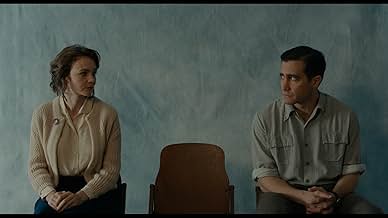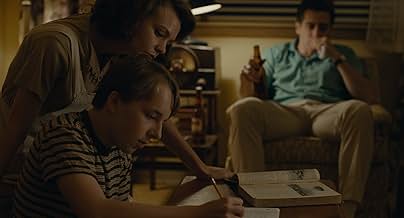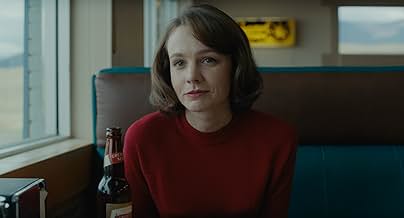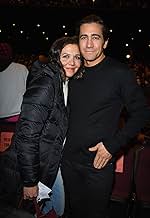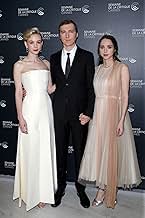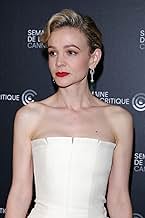A teenage boy must deal with his mother's complicated response after his father temporarily abandons them to take a menial and dangerous job.A teenage boy must deal with his mother's complicated response after his father temporarily abandons them to take a menial and dangerous job.A teenage boy must deal with his mother's complicated response after his father temporarily abandons them to take a menial and dangerous job.
- Director
- Writers
- Stars
- Awards
- 6 wins & 24 nominations total
Travis W Bruyer
- Forester
- (as Travis Bruyer)
Zoe Colletti
- Ruth-Ann
- (as Zoe Margaret Colletti)
Richard L. Olsen
- Older Policeman
- (as Richard Olson)
Lex Anastasia
- Lady
- (uncredited)
Avery Bagenstos
- Football Player
- (uncredited)
Chris Bodelle
- Shopper
- (uncredited)
- Director
- Writers
- All cast & crew
- Production, box office & more at IMDbPro
Featured reviews
Carey Mulligan and Ed Oxenbould are great in this lovely drama. The music is riveting and so is the sound editing; both ambient. I am quite intrigued by so many scenes very captivating! So glad Wildlife is available on showtime, I would highly recommend it.
This film tells the story of a couple and a teenage son, whose lives are changed by the husband's decision to fight a wildfire.
The story is simple but is surprisingly engaging. Carey Mulligan does a great job yet again, in portraying her varied and complex emotions. In fact, the husband, wife and son all portray what they are going through beautifully and convincingly, and I really feel for every character in the household.
The story is simple but is surprisingly engaging. Carey Mulligan does a great job yet again, in portraying her varied and complex emotions. In fact, the husband, wife and son all portray what they are going through beautifully and convincingly, and I really feel for every character in the household.
I usually like both coming of age movies and marriage implosion movies, but, for me, the secret to those kind of movies is that you have to like the characters so that you root for the relationships to work. Here I just didn't. Carey Mullgian's character is so hard to identify with, as she makes mistake after mistake, and Jake Gyllenhaal's is just not there for most of the movie that it is hard to root for the marriage to work. Really liked the direction, though, good debut for Paul Dano, but the screenplay left me a bit flat. I still think it's a worthy watch.
'Wildlife (2018)' is well made in every way, with its fantastic performances combining with its restrained but assured direction and solid but somewhat unremarkable script to paint a realistic portrait of a failing family seen through the slightly immature yet more world-weary than he's given credit for young lead. The piece isn't necessarily all that powerful, though, and is, sadly, pretty unmemorable, to boot. It's a bit of a strange case because I was invested in the story, characters and overall world right from the off, always involved in its twists and turns and feeling as though I was participating in its narrative (in the sense that I wasn't spoon-fed everything), but I literally forgot I had even seen the feature not two hours after getting home from the cinema, only remembering after being reminded what it was I'd just watched, which doesn't bode well for its overall lasting impact. It also marks it, perhaps, as an experience more adept at setting up a confident new directorial talent than anything else, one rife with opportunity for its actors to impressively stretch their 'acting muscles' and for its plot to portray a more nuanced view of its core players than we usually see in typical 'Hollywood' fare. Of course, your mileage will vary depending on how much it connects with you, and I'd easily recommended giving it a watch at least once. 6/10.
The directorial debut of actor Paul Dano, Wildlife is based on the 1990 novel by Richard Ford, and is written for the screen by Dano and his girlfriend Zoe Kazan. Looking at the implosion of a family from the perspective of a 14-year-old member of said family, the film is thematically similar to Revolutionary Road (2008) and Blue Valentine (2010), and aesthetically similar to the Texas scenes in The Tree of Life (2011) (the period detail drips off the screen, whilst the use of a child as the focaliser colours much of what's depicted). And although Wildlife is a piece of remarkably nostalgic filmmaking, at the same time, it tells somewhat of a progressive story, demonstrating the uncertainty with which second-wave feminism manifested itself at a grassroots level prior to really taking off in 1963. Although it's essentially a character study, the film also suggests the 1950s-style clean-cut, neatly trimmed, rigidly defined way of life, built around the perfect nuclear family wherein a wife must be subservient to her husband, is about to become a thing of the past.
Set in Great Falls, Montana in 1960, the film tells the story of the peripatetic Brinson family; father Jerry (Jake Gyllenhaal), mother Jeannette (Carey Mulligan), and 14-year-old son Joe (Ed Oxenbould). When Jerry loses his job and takes off in a misguided attempt to reaffirm his masculinity by fighting a forest fire, something is awoken in Jeanette, who, for the first time, allows herself to admit she has become deeply unhappy, and overnight, her behaviour changes dramatically, as she rebels against her domesticity. Determined to forge a new identity, she is adamant she won't become one of the "standing dead" (the term used for trees that survive a forest fire).
Importantly, the film is set three years prior to Betty Friedan's ground-breaking The Feminine Mystique (1963), which redefined the parameters of all gender-based topics, depicting a society in which women were no longer content to do their husband's bidding and raise children. Initially, Jeanette is depicted as a quintessential 1950s wife and mother, almost to the point of cliché; she cooks, cleans, washes the clothes, does the dishes, sees that Joe attend to his homework, and when Jerry loses his job, it is Jeanette who goes out looking for work for both of them. She knows that her (unspoken and unacknowledged) role in this patriarchal society is to hold the family together, but it's a role that is nothing like she thought it would be when she was younger. Although she and Jerry seem to love one another, or they certainly used to, she clearly feels trapped by her domestic situation.
That her transformation happens so quickly is the key point; when she goes to bed, she's a wife and mother, trapped in her domestic environment, but when she wakes the next morning, she realises that she has an opportunity to escape, perhaps the best opportunity she will ever get. This has been building up for years, but she has gotten so used to feeling lost that when she gets a chance to change things, she doesn't even recognise it as such, at least not at first. Once she does, however, Jeanette makes a conscious decision to stop performing the role delegated by men. As much of the female population of the western hemisphere would be asking over the next ten or so years, Jeanette wants to know, "is this all there is?" She wants more than simply getting through the day. In this sense, she recalls Nora Helmer from Henrik Ibsen's A Doll's House (1879), or any number of Tennessee Williams heroines - a woman who wakes up to find she has become deeply unhappy despite attaining everything she once wanted, and who sets out to do whatever it takes to alter her course.
That all is not well in the Brinson household is hinted at in the opening scene, where Jerry and Jeanette have a couple of inconsequential but noticeable disagreements over dinner (such as whether Joe should continue pursuing football). This scene establishes an assuredness and subtlety-of-hand that lasts for the entire film, with Dano's directorial work proving unexpectedly sophisticated. For example, something he does several times is have characters walk off-screen to speak, whilst keeping the camera trained on Joe as he tries to listen, with the dialogue barely perceptible from just off the edge of the frame. As well as being an excellent use of off-screen space, something you don't see too often, this technique ties us rigidly to Joe's POV early on, inculcating us into his worldview. Another very nice piece of direction is an early montage cutting between Jeanette riding her bike, Jerry driving the car, and Joe riding the bus, in which each character is facing a different direction, each in isolation from the other two. It's basic cinematic shorthand, showing instead of telling, but it's very well done. Equally impressive is the penultimate scene, where Dano uses the windows of the Brinson house to block the characters in such a way as to suggest both their inner emotions, and the prevailing theme at this point of the film. For the most part, however, Dano's direction is invisible, relying far more on static painterly compositions than camera movement.
The acting, as you would expect, is universally superb. On paper, Jeanette and Warren Miller (a superb Bill Camp), an older man who becomes romantically interested in her, are very much the villains of the piece, but Mulligan and Camp's performances are so full of warmth and genuine emotion that you simply can't look at them as antagonists, and the film itself never judges them. Mulligan plays Jeanette as utterly weary, much older than her years, at times fragile, at times rock solid, both vulnerable and manipulative. Full of anger, she simply can't hold in her emotions any more. Unfortunately, in letting them out, she betrays Joe by forgetting he is only 14-years-old. When she starts drunkenly dancing with him at Miller's house, the scene is deeply uncomfortable, but Mulligan's performance is such that we don't condemn her, at least, not completely. She never allows the audience to lose sight of the fact that although she is behaving rather poorly, she is a prisoner, and is reacting against her restraints as best she can.
Of course, there are a few problems. Essentially a tale of marital angst, the narrative is not especially original - we've seen this story before, many times in fact, and for all the craft on display, Dano never really manages to say anything wholly new. Additionally, his measured direction is also too good in places - everything is so ordered, neat, and trim, that at times, the milieu doesn't seem lived-in, but more an abstract concept of what the period was like. Additionally, there are a few lines that sound great on paper, but which are just not the kind of things one says in real life. For example, Jeanette tells Joe, "I feel like I need to wake up, but I don't know what from, or what to". Later she says, "I wish I was dead. If you have a better plan for me, tell me. Maybe it'll be better than this". This kind of dialogue seems more interested in hitting thematic waypoints than developing character beats. Similarly, late in the film, Jerry says to Joe, "It's a wild life. Isn't it, son?" Proclaiming the film's title in this context doesn't even remotely work, and the line feels totally out of place, to the point of ripping you out of the narrative.
On the one hand, Wildlife is about how society was changing in 1960, and on the other, about how that change manifests itself within the Brinson family. Yes, it's another "death of the American dream" story in a long line of such films, but here, the focus is, for the most part, on character rather than theme, with Jeanette functioning in kind of a synecdochical manner; our specific entry point, she is the individual that facilitates an examination of the masses. And yes, Dano may take his eye off the ball a couple of times, with the odd bit of clunky dialogue, and a somewhat too picture-postcard perfection, but all in all, this is an excellent directorial debut.
Set in Great Falls, Montana in 1960, the film tells the story of the peripatetic Brinson family; father Jerry (Jake Gyllenhaal), mother Jeannette (Carey Mulligan), and 14-year-old son Joe (Ed Oxenbould). When Jerry loses his job and takes off in a misguided attempt to reaffirm his masculinity by fighting a forest fire, something is awoken in Jeanette, who, for the first time, allows herself to admit she has become deeply unhappy, and overnight, her behaviour changes dramatically, as she rebels against her domesticity. Determined to forge a new identity, she is adamant she won't become one of the "standing dead" (the term used for trees that survive a forest fire).
Importantly, the film is set three years prior to Betty Friedan's ground-breaking The Feminine Mystique (1963), which redefined the parameters of all gender-based topics, depicting a society in which women were no longer content to do their husband's bidding and raise children. Initially, Jeanette is depicted as a quintessential 1950s wife and mother, almost to the point of cliché; she cooks, cleans, washes the clothes, does the dishes, sees that Joe attend to his homework, and when Jerry loses his job, it is Jeanette who goes out looking for work for both of them. She knows that her (unspoken and unacknowledged) role in this patriarchal society is to hold the family together, but it's a role that is nothing like she thought it would be when she was younger. Although she and Jerry seem to love one another, or they certainly used to, she clearly feels trapped by her domestic situation.
That her transformation happens so quickly is the key point; when she goes to bed, she's a wife and mother, trapped in her domestic environment, but when she wakes the next morning, she realises that she has an opportunity to escape, perhaps the best opportunity she will ever get. This has been building up for years, but she has gotten so used to feeling lost that when she gets a chance to change things, she doesn't even recognise it as such, at least not at first. Once she does, however, Jeanette makes a conscious decision to stop performing the role delegated by men. As much of the female population of the western hemisphere would be asking over the next ten or so years, Jeanette wants to know, "is this all there is?" She wants more than simply getting through the day. In this sense, she recalls Nora Helmer from Henrik Ibsen's A Doll's House (1879), or any number of Tennessee Williams heroines - a woman who wakes up to find she has become deeply unhappy despite attaining everything she once wanted, and who sets out to do whatever it takes to alter her course.
That all is not well in the Brinson household is hinted at in the opening scene, where Jerry and Jeanette have a couple of inconsequential but noticeable disagreements over dinner (such as whether Joe should continue pursuing football). This scene establishes an assuredness and subtlety-of-hand that lasts for the entire film, with Dano's directorial work proving unexpectedly sophisticated. For example, something he does several times is have characters walk off-screen to speak, whilst keeping the camera trained on Joe as he tries to listen, with the dialogue barely perceptible from just off the edge of the frame. As well as being an excellent use of off-screen space, something you don't see too often, this technique ties us rigidly to Joe's POV early on, inculcating us into his worldview. Another very nice piece of direction is an early montage cutting between Jeanette riding her bike, Jerry driving the car, and Joe riding the bus, in which each character is facing a different direction, each in isolation from the other two. It's basic cinematic shorthand, showing instead of telling, but it's very well done. Equally impressive is the penultimate scene, where Dano uses the windows of the Brinson house to block the characters in such a way as to suggest both their inner emotions, and the prevailing theme at this point of the film. For the most part, however, Dano's direction is invisible, relying far more on static painterly compositions than camera movement.
The acting, as you would expect, is universally superb. On paper, Jeanette and Warren Miller (a superb Bill Camp), an older man who becomes romantically interested in her, are very much the villains of the piece, but Mulligan and Camp's performances are so full of warmth and genuine emotion that you simply can't look at them as antagonists, and the film itself never judges them. Mulligan plays Jeanette as utterly weary, much older than her years, at times fragile, at times rock solid, both vulnerable and manipulative. Full of anger, she simply can't hold in her emotions any more. Unfortunately, in letting them out, she betrays Joe by forgetting he is only 14-years-old. When she starts drunkenly dancing with him at Miller's house, the scene is deeply uncomfortable, but Mulligan's performance is such that we don't condemn her, at least, not completely. She never allows the audience to lose sight of the fact that although she is behaving rather poorly, she is a prisoner, and is reacting against her restraints as best she can.
Of course, there are a few problems. Essentially a tale of marital angst, the narrative is not especially original - we've seen this story before, many times in fact, and for all the craft on display, Dano never really manages to say anything wholly new. Additionally, his measured direction is also too good in places - everything is so ordered, neat, and trim, that at times, the milieu doesn't seem lived-in, but more an abstract concept of what the period was like. Additionally, there are a few lines that sound great on paper, but which are just not the kind of things one says in real life. For example, Jeanette tells Joe, "I feel like I need to wake up, but I don't know what from, or what to". Later she says, "I wish I was dead. If you have a better plan for me, tell me. Maybe it'll be better than this". This kind of dialogue seems more interested in hitting thematic waypoints than developing character beats. Similarly, late in the film, Jerry says to Joe, "It's a wild life. Isn't it, son?" Proclaiming the film's title in this context doesn't even remotely work, and the line feels totally out of place, to the point of ripping you out of the narrative.
On the one hand, Wildlife is about how society was changing in 1960, and on the other, about how that change manifests itself within the Brinson family. Yes, it's another "death of the American dream" story in a long line of such films, but here, the focus is, for the most part, on character rather than theme, with Jeanette functioning in kind of a synecdochical manner; our specific entry point, she is the individual that facilitates an examination of the masses. And yes, Dano may take his eye off the ball a couple of times, with the odd bit of clunky dialogue, and a somewhat too picture-postcard perfection, but all in all, this is an excellent directorial debut.
Did you know
- TriviaWhen Paul Dano requested the rights to adapt Richard Ford's novel into this movie he received the following response: "I am grateful to you for your interest in my book, but I should also say this in hopes of actually encouraging you. My book is my book, your picture, were you to make it, is your picture. Your movie maker's fidelity to my novel is of no great concern to me. Establish your own values, means, goal. Leave the book behind so it doesn't get in the way."
- GoofsAt 1:05:47, when Jeanette is standing near Joe, her lipstick is faded. At 1:05:57, when she turns around to put her arms in the coat, It's dark again.
- ConnectionsFeatured in CTV News at Six Toronto: Episode dated 10 September 2018 (2018)
- SoundtracksSincerely
Written by Harvey Fuqua & Alan Freed
Performed by The Moonglows
Courtesy of Geffen Records
Under license from Universal Music Enterprises
- How long is Wildlife?Powered by Alexa
Details
- Release date
- Country of origin
- Official sites
- Languages
- Also known as
- Дике життя
- Filming locations
- Production companies
- See more company credits at IMDbPro
Box office
- Gross US & Canada
- $1,050,616
- Opening weekend US & Canada
- $104,589
- Oct 21, 2018
- Gross worldwide
- $3,321,367
- Runtime1 hour 45 minutes
- Color
- Aspect ratio
- 1.85 : 1
Contribute to this page
Suggest an edit or add missing content








